Compound NounA compound noun appears to be a straightforward notion at first glance. It's a phrase made up of two or more separate nouns joined collectively. 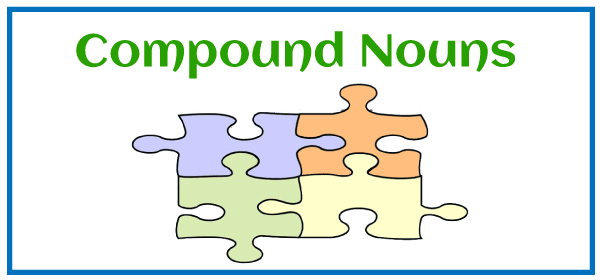
Compound nouns are a regular element of English speech and writing. In reality, compound nouns are so common in English that you may not even recognize that a few of the words you often use are compound nouns. These are just illustrations: software, sunset, and suitcase. What is a Compound Noun?A compound noun is that is formed by two or more words. A compound noun is often [noun + noun] or [adjective + noun], but some other possibilities exist (see below). Compound nouns must be understood and recognized. Each compound noun operates as a separate and distinct entity that could be utilized along with adjective as well as other noun. A compound noun is a term that works as a noun when combined with another word. The first portion usually identifies the type or purposes, and the second section specifies who and what is being labeled. For instance, the term "fire" in the name firehouse denotes the type of dwelling it is (one for fighting fires). The resultant word's definition is distinct from either of its constituent parts. Compound nouns can be in any of the following three types:
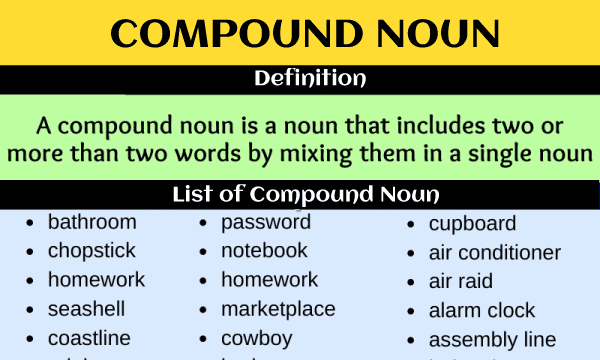
Some instances of this type of noun In phrases, closed-form compound nouns (no space or hyphen) encompass: The lighthouse warns mariners to stay clear of the hazards. Keep an eye out for the butterfly on the blossom over there. In the event of an earthquake, you must protect your furnishings. Hyphenated compound nouns are also possible. These are some examples: Jessica exercises so frequently that she does have a six-pack. Consider giving the bouncy ball to the five-year-old in a row. You're a really thoughtful son-in-law to send us this gift. Finally, compound nouns in open form with a gap between both the words can be found. Here are several examples: Can you go to the post office earlier in the day? That tax break is only for the middle and lower classes. This is our province's only female attorney general. How to Construct a Compound NounEvery compound noun is made up of two or more words that are usually combined to make the noun. This type of noun can either be a common noun (for e.g., fish sticks), a proper noun (for e.g., Pizza Hut), or an abstract word (for e.g., lovesickness). These separate terms are not necessarily to be noun in and of them; only they require to convey or explicit a particular individual, location, idea, or thing. You can make a compound noun out of any part - of - speech, not really nouns, as far as it acts as a noun in the statement. Adjectives, prepositions, and verbs are examples of other components of speech that can be used to produce compound nouns. The criteria for word form might vary based on the parts of speech utilized to produce the composite noun. For instance, the term redhead refers to "an individual with red-orange hair," whereas a redhead refers to "a head that is red." Is it closed, open, or hyphenated?To be honest, there are no principles that control why certain compound words are hyphenated, while some are closed, and many others remain open. You can learn irregular verbs by studying a word list or consulting a thesaurus. Common terms in American English are typically closed, while uncommon words frequently utilize hyphens or open variants. It is really important to note that common compound nouns often lose the space or hyphen over overtime. For instance, "on-line" has recently become "online." "Take-out" has been shortened to "takeout." A hyphen is commonly used in British/Canadian English. The Shorter Oxford Dictionary, for instance, uses pot-belly, whilst the American one uses potbelly. People find that the categories with verbs are the most difficult. Some words are clear (swimming pool, public speaking), while others are more difficult (decision-making or decision-making?). The choice to hyphenate or not to hyphenate is dictated by the guidebook you're employing, and it typically relies on the term in question. It also relies on whether the term is used as a compound noun or a compound adjective, each of which has its own set of rules and regulations. Identifying compound nounsYou'll start spotting compound nouns everywhere after you've learned to distinguish them. Bloodbath? The noun that is compounded. Hamburger? A noun that is compounded. What are the terms for a software developer, an escape route, cryptocurrency, an outline, and a garlic knot? They are all compound nouns. What about brunch, which is a hybrid of breakfast and lunch? Brunch is a portmanteau, not yet a compound noun. A compound noun binds two words altogether, whereas a portmanteau unites two words. How about a crystal-clear view? It's a compound adjective, not a single adjective. Compound nouns can be difficult to understand. These tips and guidance can assist you in ensuring that you're utilizing them correctly (and effectively!) by spotting any errors, avoiding language mistakes, make you efficient in this form of now. Give this a shot right now. Plural and Possessive Principles for Compound NounThere is a common question- can you make the compound noun as plural or possessive? As one might expect, there really are no strict guidelines regarding the plural of compound terms, particularly because some hyphens are dropped across time. 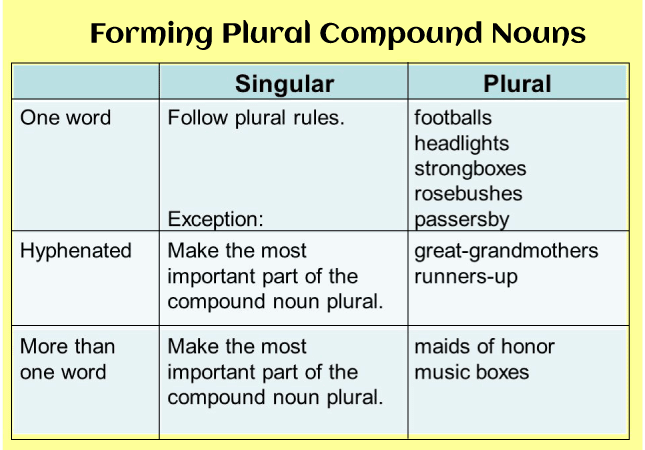
Among the more prevalent rules are:
Noun Phrase vs. Compound NounCompound nouns vary from noun phrases, which are modifier + noun phrases. A hot dog, for instance, is a kind of sausage that is often consumed on buns. It could be hot, but this is not a dog. This is not the same as combining the adjective like "hot" and the noun "dog," which normally alludes to an overheated dog. Look at the distinction in the below phrases: When we visit the state fair, I'd like to have a hot dog. The hot dog was relieved to locate a cool location to rest. The first phrase contains the compound word "hot dog," whereas the second does not. Generally, you can understand. The distinction is usually discernible by carefully evaluating the statement setting and by attentively considering the pronunciation. Compound nouns normally accent the very first term ("HOT dog" - the meal), whereas noun phrases do not emphasize either term ("hot dog" - a doggy that is hot) 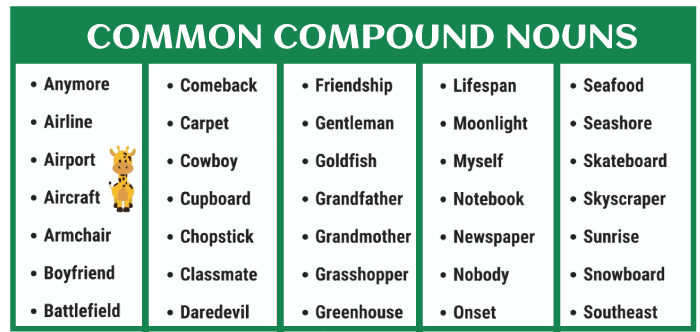
Compound Noun ExamplesCompound nouns are used as a single word. This type of noun is constructed by combination two words (from distinct parts of speech) into a single term. Here are some instances of compound nouns made up of various kinds of words: Noun + noun: lunchtime, girlfriend, milkman, firefighter, heartache Verb + noun: jailbreak, hairstyle, runtime, turntable, sweatshirt, buzzkill Adjective + noun: smartphone, redbird, redhead, greenhouse Preposition + noun: downtown, bystander, underlined, overload Verb + preposition: shutdown, offshoot, upturn, input, uproar 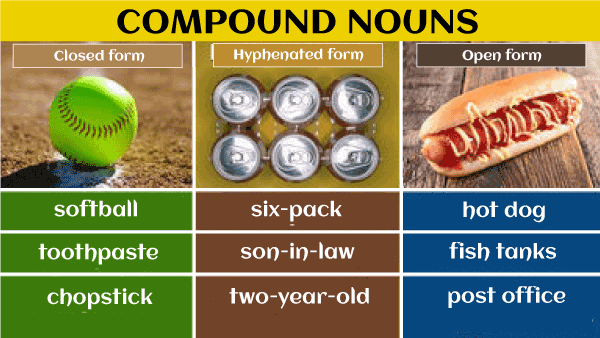
Compound Nouns as Distinct And Independent WordsThis kind of compound noun is constructed by combining two independent words that behave grammatically as a single entity. This sort of compound noun differs from a noun phrase in that one term does not serve as a modifier for the other. You must use caution when using this form of compound noun since it may appear similar to an example of two separate terms that aren't used as a compound. Hot dog, for example, alludes to a portion of food, whereas the distinct phrase "hot dog" relates to a furry animal that is very warm, as already discussed above. Noun + noun: pool party, grandmother clock, cardigan vest, Xmas tree Verb + noun: flash flood, grab bag, bounce cut, slam dunk, shock jock Adjective + noun: quick fix, quick profits, slow burn, dual agent, hard call Hyphenated compound nounsThis form of the compound noun is frequently mixed up with some other two. Through the use of hyphens to make compound nouns is especially common in emerging or less often used terminology. When more than two words are combined to produce a compound noun, hyphens are almost usually used. know-it-all, mom-in-law, jack-in-the-box, fire-fly, jack-of-all-trades, by-product, no-brainer, hocus-pocus, merry-go-round, two-fold The Distinction between Compound and Collective NounsSo far, we've glanced at a variety of compound noun instances. Compound nouns are created by merging many words into a single noun. Another sort of noun combines numerous words to produce a single noun. A collective noun is a word that is implied to a group of individuals or items as a single entity. Collective nouns include the terms like army, band, stack, heap, gang, and batch. Collective nouns, unlike compound nouns, do not have to be created from numerous words. Compound nouns and collective nouns, for the most part, satisfy the same laws as regular nouns. They could both be singular or plural nouns. Both types of nouns might be tangible or abstract. Both can function as possessive nouns. Although uncommon, a noun can be either a compound noun or a collective noun. For instance, homeroom is a compound noun made up of the phrases home and room. Homeroom could also be employed as a collective noun to allude to a group of pupils. ConclusionCompound nouns are just one example of how the English language has grown richer through time. While your mind is wrapping itself around the subject, consider the siblings to compound nouns. Taking some time to become acquainted with compound adjectives and compound verb can help you broaden your grasp of compound terms.
Next TopicCountable and Uncountable Noun
|
 For Videos Join Our Youtube Channel: Join Now
For Videos Join Our Youtube Channel: Join Now
Feedback
- Send your Feedback to [email protected]
Help Others, Please Share









